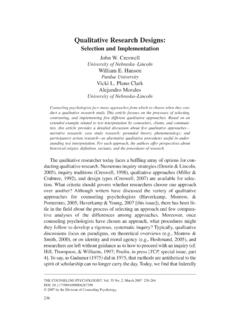Transcription of 5 Introduction to qualitative research 2009
1 An Introduction to qualitative research Authors Beverley Hancock Elizabeth Ockleford Kate Windridge The NIHR research Design Service for Yorkshire & the Humber The NIHR RDS for the East Midlands / Yorkshire & the Humber 2009 qualitative research 2 This Resource Pack is one of a series produced by The NIHR RDS for the East Midlands / The NIHR RDS for Yorkshire and the Humber. This series has been funded by The NIHR RDS EM / YH. This Resource Pack may be freely photocopied and distributed for the benefit of researchers. However it is the copyright of The NIHR RDS EM / YH and the authors and as such, no part of the content may be altered without the prior permission in writing, of the Copyright owner.
2 Reference as: Hancock B., Windridge K., and Ockleford E. An Introduction to qualitative research . The NIHR RDS EM / YH, 2007 Beverley Hancock The Department of Primary Care & General Practice University of Birmingham Kate Windridge and Elizabeth Ockleford The NIHR RDS for the East Midlands / Yorkshire & the Humber (Leicester) Department of Health Sciences University of Leicester Last updated: 2009 The NIHR RDS for the East Midlands Division of Primary Care, 14th Floor, Tower building University of Nottingham University Park Nottingham NG7 2RD Tel: 0115 823 0500 Leicester: Nottingham: The NIHR RDS for Yorkshire & the Humber ScHARR The University of Sheffield Regent Court 30 Regent Street Sheffield S1 4DA Tel: 0114 222 0828 Sheffield: Leeds: York.
3 Copyright of The NIHR RDS EM / YH (2009) The NIHR RDS for the East Midlands / Yorkshire & the Humber 2009 qualitative research 3 Table of Contents Page 1. 4 2. The Nature of qualitative 6 3. Approaches to qualitative research .. 9 4. qualitative Data Collection Methods .. 16 5. qualitative Sampling and 21 6. qualitative 24 7. Presenting qualitative 31 8. 33 9. Feedback on 34 10. Further 37 The NIHR RDS for the East Midlands / Yorkshire & the Humber 2009 qualitative research 4 1. Introduction Common sense and research both involve an attempt to understand various aspects of the world. However research , but arguably not common sense, involves an explicit, systematic approach to finding things out, often through a process of testing out preconceptions.
4 This process begins with deciding on a research question. It is then necessary to conduct a literature review and to decide on a research design which addresses the research question. Decisions made at this point include considering what kind of data will be collected, how they will be collected, who will be invited to participate and how the data will be analysed. Researchers working in the social sciences: psychology, sociology, anthropology etc., interested in studying human behaviour and the social world inhabited by human beings, found increasing difficulty in trying to explain human behaviour in quantifiable, measurable terms. Measurements tell us how often or how many people behave in a certain way, so if a research question involves exploring how much or how often something happens, it s probably appropriate to use quantitative methods.
5 qualitative research attempts to broaden and/or deepen our understanding of how things came to be the way they are in our social world. If the research question involves exploring how people experience something, or what their views are, exploring a new area where issues are not yet understood or properly identified ( before developing questionnaire items), assessing whether a new service is implementable, looking at real-life context, or a sensitive topic where you need flexibility to avoid causing distress, your team probably needs to discuss using qualitative methodology. The purpose of this resource pack is to enable health and social care professionals with little or no previous experience of research to gain a basic understanding of qualitative research and the potential for this type of research in health care.
6 The pack begins with a general Introduction to the nature of qualitative research . This includes identification of the place of qualitative research in a brief comparison with quantitative research . There follow short descriptions of the main qualitative approaches and ways of collecting information. Clear and practical guidance is provided on techniques for analysing and presenting qualitative research . Theoretical information is reinforced through exercises and examples drawn from the fields of health and social care research . The pack gives only a brief Introduction to qualitative research and readers planning to undertake projects using one of the methods described should consult other texts (see suggestions at the end) and seek additional advice from experienced qualitative researchers.
7 The NIHR RDS EM / YH offers a range of courses and gives advice clinics which at the time of updating this pack (Feb 2007) are free to NHS and social care researchers. The NIHR RDS for the East Midlands / Yorkshire & the Humber 2009 qualitative research 5 LEARNING OBJECTIVES To provide the reader with a basic understanding of qualitative research . To equip the reader with sufficient information to appreciate how qualitative research is undertaken. To enable prospective researchers to consider the appropriateness of a qualitative approach to their chosen field of investigation. To provide practitioners contemplating or undertaking qualitative research for the first time with guidance on the collection, analysis and presentation of data.
8 The NIHR RDS for the East Midlands / Yorkshire & the Humber 2009 qualitative research 6 2. The Nature of qualitative research All research , whether quantitative or qualitative , must involve an explicit ( auditable), disciplined, systematic approach to finding things out, using the method most appropriate to the question being asked. Consideration should be given to these common goals, although the differences between qualitative and quantitative research have often been exaggerated in the past. The table below summarises some of the ways in which qualitative and quantitative research do differ: Table 1 qualitative research Quantitative research tends to focus on how people or groups of people can have (somewhat) different ways of looking at reality (usually social or psychological reality) tends to focus on ways of describing and understanding reality by the discovery of general laws takes account of complexity by incorporating the real-world context can take different perspectives on board takes account of complexity by precise definition of the focus of interest and techniques that mean that external noise can be discounted studies behaviour in natural settings or uses people s accounts as data.
9 Usually no manipulation of variables involves manipulation of some variables (independent variables) while other variables (which would be considered to be extraneous and confounding variables) are held constant focuses on reports of experience or on data which cannot be adequately expressed numerically uses statistical techniques that allow us to talk about how likely it is that something is true for a given population in an objective or measurable sense focuses on description and interpretation and might lead to development of new concepts or theory, or to an evaluation of an organisational process focuses on cause & effect - uses experiment to test (try to disprove) an hypothesis employs a flexible, emergent but systematic research process requires the research process to be defined in advance The NIHR RDS for the East Midlands / Yorkshire & the Humber 2009 qualitative research 7 qualitative research is concerned with developing explanations of social phenomena.
10 That is to say, it aims to help us to understand the social world in which we live and why things are the way they are. It is concerned with the social aspects of our world and seeks to answer questions about: Why people behave the way they do How opinions and attitudes are formed How people are affected by the events that go on around them How and why cultures and practices have developed in the way they have In a health or social care setting, qualitative research is particularly useful where the research question involves one of the situations below and people s experiences and views are sought: exploration or identification of concepts or views exploration of implementability the real-life context sensitive topics where flexibility is needed to avoid causing distress In the past the distinguishing features of qualitative and quantitative research have been used as criticisms by proponents of the other methodology.













